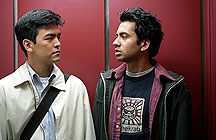|
|
|
|
Harold
& Kumar Go to White Castle
|
 |
|
One of the weirdest developments in American pop cinema since the '90s has been the merging of lowbrow comedy with a certain kind of action-thriller – the kind concerned with average, middle-class civilians straying beyond their comfort zones and entering the badlands over the border, in the woods, on the other side of town or even just the other side of the street. These days, the belching, farting, ever-horny heroes of the trash comedy genre are forever taking road trips into such unfamiliar areas. And what they find there is usually a nightmarish underclass peopled by violent, kinky crazies. Harold & Kumar Go to White Castle is among the most endearing variations on this kind of journey. Harold (John Cho) and Kumar (Kal Penn) are two thrill-seeking post-grads who find it hard adjusting to the obligations of the adult world. One night, they blow off steam by hitting the road and searching for their Holy Grail – a plate of cheap burgers at White Castle. This burger proves almost as elusive as the door that nobody could find in Buñuel's The Exterminating Angel (1962) – and this film has about as many bizarre fantasy sequences as that surrealist masterpiece. In many ways, Harold & Kumar plays by the standard trash comedy rules, especially as set out in director Danny Leiner's previous hit, Dude, Where's My Car? (2000). The central characters live in a consumerist paradise shallowly defined by pop culture references barely twenty years old – although even this offers little solace when Doogie Howser himself (Neil Patrick Harris) shows up as an over-sexed, drugged-out, car-stealing maniac long past his teen glory days. As always, there is the niggling unalignment between the sex-obsession which rules the main characters and the squeaky-clean chasteness of what they actually ever do. Even more disconcertingly, there is an insistent string of gay jokes that threatens to overwhelm almost every other plot thread. There are interludes worthy of Deliverance (1972), especially when a hideously grotesque hillbilly named Freakshow (an unrecognisable Christopher Meloni from TV's Law and Order: SVU) offers group sex. And there are madcap celebrations of youthful anarchy – my favourite being Kumar's dream of what it would be like to marry a giant, living bag of marijuana (female, in case you were wondering). But the great novelty of this film is its race card. Harold and Kumar themselves bring in, respectively, Asian and Indian references. This could have simply remained a token element, but Leiner and his writers never cease multiplying the jokes about American multiculturalism, at once mocking and celebrating it. One such enlightened interlude introduces us to a black brother who has been wrongfully jailed. He believes in pacifism, but even for him the oppression doled out by demented white cops becomes too much to bear. When last we see him he is on the evening news, declaring that he loves "all blacks, all whites ... and even some Mexicans". © Adrian Martin September 2004 |
![]()